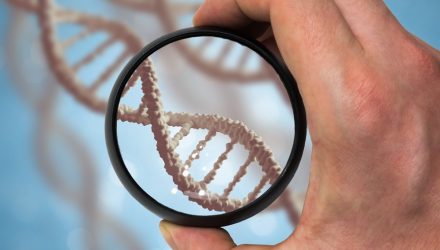The healthcare sector has long been a mecca of innovation and one of the key elements in that theme is the evolution of genetics. Not only does that profound effects on patient outcomes, but there are significant implications for investors as well.
The ARK Genomic Revolution ETF (ARKG) is among the exchange traded funds providing genetics and genomics exposure to investors. As an actively managed ETF, ARKG could stand out in this category because genetics evolution and the related investment consequences can rapidly shift, potentially exposing flaws in index-based strategies along the way.
That ability to be responsive is a significant point in ARKG’s favor because genomics has made good on the promise of evolution, growing into two primary fields — gene editing and gene therapy — both of which are homes to a variety of investable concepts. However, there are important differences between these two fields that investors should be aware of.
“The major difference here is that in gene therapy you just deliver a snippet of a gene or pre-programmed message to the body that then allows the body to make the protein that’s missing, With gene editing, instead what you do is you go in and you directly edit the genes in the person’s body, potentially giving a long lasting cure to that person. So obviously two different approaches, but both could be very effective,” noted Matthew Harrison, head of U.S. biotech at Morgan Stanley.
Several of ARKG’s member firms are exposed to gene therapies while others are at the forefront of gene editing. Both fields could be significant drivers of long-term growth because only a small amount of gene therapies have been approved in the U.S. while regulators here haven’t yet signed off on gene editing concepts.
“So it’s likely going to be several years before those reach the market. As, again as we’ve seen happen time and time again in biopharma as these new therapies and new platforms are rolled out they have very broad potential. And obviously there’s a lot of excitement here around these genetic medicines and thinking about where these could be applied,” added Terence Ross, head of U.S. pharmaceuticals at Morgan Stanley.
Another longer-ranging catalyst for some ARKG components is costs. As these companies more adept at producing approvable, successful drugs and therapies, it’s possible that they’ll be able to make costs more approachable for healthcare providers and patients. That’s relevant because today, some genetics offerings can cost upwards of six or seven figures.
For more news, information, and analysis, visit the Disruptive Technology Channel.
The opinions and forecasts expressed herein are solely those of Tom Lydon, and may not actually come to pass. Information on this site should not be used or construed as an offer to sell, a solicitation of an offer to buy, or a recommendation for any product.

